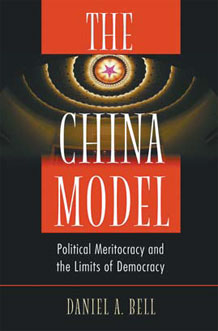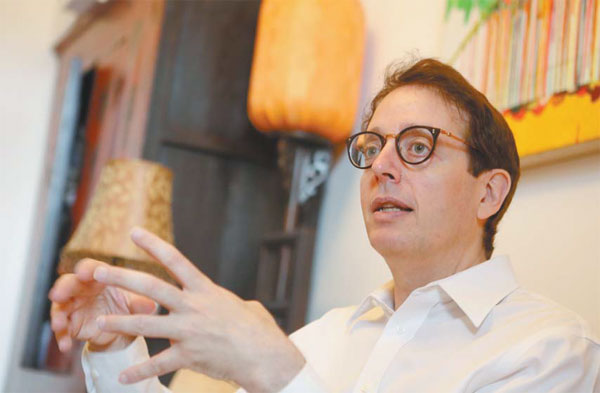The meritocracy of the Chinese system
Updated: 2015-07-24 08:12
By Andrew Moody and Ed Zhang(China Daily Europe)
|
|||||||||||
Author argues that one of the weaknesses of Western democracy is voters are often ignorant of issues
Daniel Bell is somewhat surprised by the major international interest in his new book.
A tract on political philosophy that runs to just 198 pages (although there are a further 106 pages of footnotes) might normally generate only modest or polite academic interest.

But The China Model: Political Meritocracy and the Limits of Democracy (Princeton University Press) is perhaps set to be the most important book about China in English this year.
It has already had full reviews in the Financial Times and the Wall Street Journal among others and was selected in The Guardian by the philosopher and writer Julian Baggini as a summer book to take to the beach, citing it as an "uncomfortable challenge" to his liberal beliefs.
"I feel sorry for him, if that is his holiday reading," laughs Bell in his apartment on the Tsinghua university campus, where he has been a professor of ethics and political philosophy for a decade.
The book has been seen as comparing Western liberal democracy unfavorably with the Chinese meritocratic system of government. He insists, however, that this is not what he has attempted to do.
"I am not in favor of the US system of government being replaced by the Chinese system or the other way round. That is crazy," he says.
"I have had a lot of people - as you can imagine - who disagree with it. Some of them have used up column space to talk about their own ideas and not engage with the book at all. But I have had some positive reaction also."
Bell, 51, dressed in open-necked shirt and shorts on a hot Beijing afternoon, wanted to challenge the idea that Western liberal democracy was some sort of universal ideal.
"I think in Western countries, academics and the popular media generally think that government is just about one person, one vote, regardless of whether a country is very small or has 1 billion people. The actual concept of democracy is also more complex than that too."
He believes many underestimate the depth of experience of China's leadership. Of the 7 million cadres that start out at primary-level office, not many make it to province or ministry-level.
To be one of the seven members elected to the very apex of the system - the Standing Committee of the Politburo - someone has to have been governor or Party secretary of at least two provinces. Someone of Barack Obama's pre-presidential experience would have only made it to be the manager of a small county in China's system, according to an expert he quotes.
|
Daniel Bell says he is not in favor of the US system of government being replaced by the Chinese system or the other way round. Wang Jing / China Daily |
"People do not understand the meritocratic aspects of the Chinese system. There are three standards of what counts as being a good political leader, which I discuss in the book. The first is intellectual quality, the second is social skills and the third is virtue, meaning commitment to the good of the community. The Chinese political system is designed so leaders score above average in all three of these."
Bell believes Obama's lack of experience and social skills has been evident in his inability to get legislation through Congress by networking with senators over a late night whiskey in the style of a Lyndon B. Johnson or Franklin Delano Roosevelt.
"He is highly intelligent certainly but doesn't enjoy that side of it. It is where he doesn't have a lot of background and experience."
Bell, who is Canadian, studied at McGill University in Montreal and at Oxford, where he met his wife, Song Bing, who now works for Goldman Sachs in Beijing, in 1989."After we first met I went to Middlebury College (Vermont) to learn Chinese intensive and she went there to learn French, which she didn't speak. At home, we used to speak a mixture of Chinese, French and English. Our kid was hopelessly confused."
After that he pursued an academic career that took him to Singapore and Hong Kong before landing at Tsinghua in 2004.
He is previously best known for his work on Confuciansim, which he says is now very relevant to the Chinese political system
The book itself brings together thoughts and ideas he has also published in articles and papers.
"I did it the wrong way round because the normal way is to write the book first and then write a series of op-eds and comment articles afterwards."
He is adamant Western government systems and the Chinese model are not necessarily polar opposites with there being elections in the Chinese system at local level.
"I think one person, one vote works best at a local level because the people know the leaders they are electing," he says.
One of the weaknesses of Western democracy, he argues, is that voters are often ignorant of the issues they are voting on. He cites the average American thinking that 18 percent of the federal budget is spent on foreign aid when the reality is 1 percent.
There are those that argue, however, that despite the ignorance of some voters, they generally make the correct choices at elections, just as court juries often deliver the right verdict.
"The jury system is an in interesting analogy but ultimately it doesn't require a brilliant person to figure out whether the guy committed murder or not. Some of the issues a government decides on are so empirically complex they do take brilliant people to make the right decisions."
Bell says there are risks of inane voter prejudices being translated into policies in modern Western democracies, particularly in the US.
"You have leaders in Congress who are often of so low quality that if voters have these strong anti-immigration views or anti-gay views or irrational economic opinions they can actually get translated into policy making. That is what is scary about it."
The strength of the China system, he argues, is "experimentation", where policies can be trialed in local areas such as the creation of special economic zones in the 1980s, which kickstarted China's 35-year economic revival.
Bell insists the reintroduction of a meritocratic system of recruiting officials with tough examination entry in the 1990s should stand China in good stead with its future generations of leaders. "They are high-level IQ tests. I have seen them and they are really hard," he says.
He says in the book the exams are likely to be beyond US politician Sarah Palin or Toronto's former mayor Rob Ford.
There are those who question how open democracies are when in the US you have the possibility of the wife of a former president, Hillary Clinton, perhaps set to face Jeb Bush, the brother and son of former presidents, in the 2016 presidential race.
Bell thinks, however, there are meritocratic aspects to this in the same way as Lee Hsien Loong, the eldest son of Lee Kuan Yew, becoming prime minister of Singapore.
"In a way it is not surprising because where do you get the skills to be a politician but from experience. If from a young age you are dealing with political elites all the time, gaining these skills is so much easier."
Bell, who is directing the Berggruen Institute of Philosophy and Culture to promote academic exchanges, says a major issue is there is very little understanding among Western academics and experts of the Chinese political system.
"Academics just fly in for a week and leave. They don't really engage. In the old days John Dewey (the American philosopher) and Bertrand Russell would spend a year here," he says.
Contact the writers through andrewmoody@chinadaily.com.cn
Zhang Yue contributed to the story.
(China Daily European Weekly 07/24/2015 page33)
Today's Top News
Greek PM under pressure over drachma plan
FT sale to Japan's Nikkei includes Chinese website
Beijing condemns Somali attack, mourns deaths
Stocks make sharpest daily decline since 2007
Tian'anmen gets early makeover for grand parade in September
Olympic bid panel cites city's merits
Discovery of Earth-like planet disappoints Chinese Web users
Financial Times sale – the deal no-one saw coming
Hot Topics
Lunar probe , China growth forecasts, Emission rules get tougher, China seen through 'colored lens', International board,
Editor's Picks

|

|

|

|

|

|







